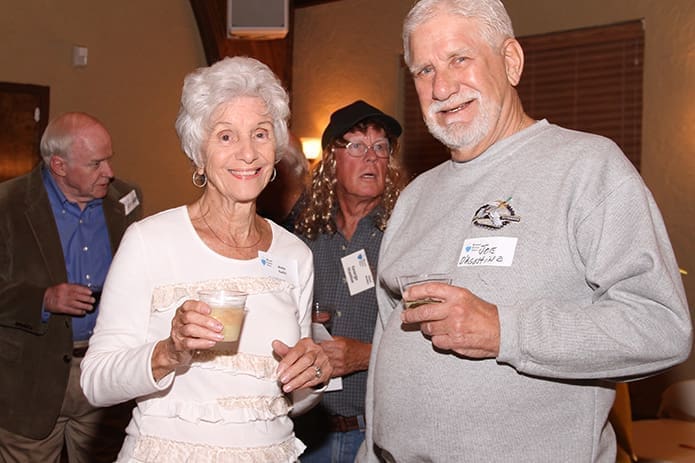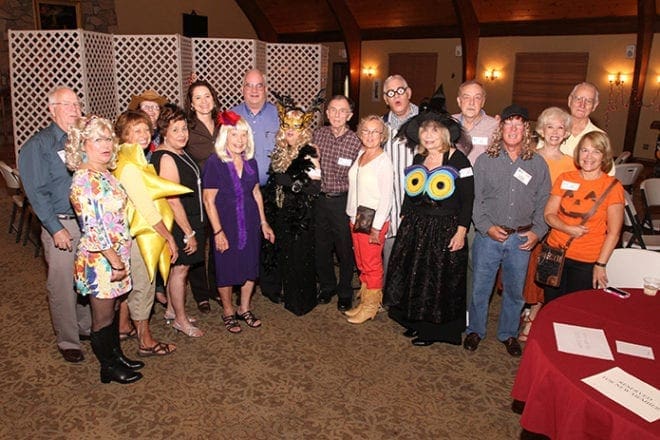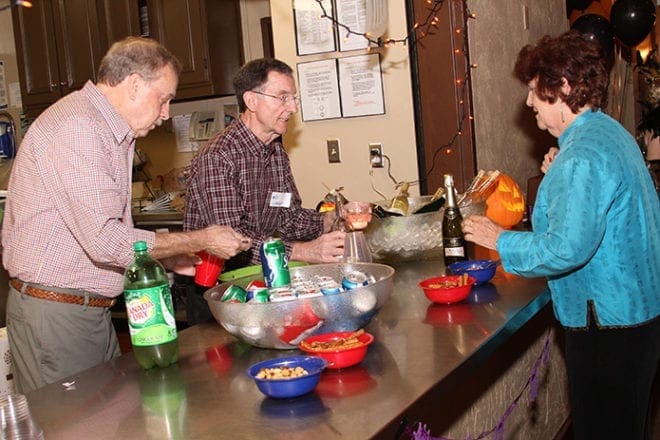 Photo By Michael Alexander
Photo By Michael AlexanderMarietta
St. Ann’s ministry for the widowed going strong at 10 years
By ANNE NEUFELD RUTZ Special to the Bulletin | Published November 7, 2013
MARIETTA—The scene is a large social hall: the conversations buzz, laughter abounds, men and women carry their drinks and appetizers from one group of people to the next, mingling. It might sound like any cocktail party, but this is a recent gathering of Widowed Helping Others, a ministry at St. Ann Church in Marietta for widows and widowers.
The WHO ministry, which just marked its 10th anniversary, began as a place to offer comfort, healing and a social outlet to women and men coping with the death of their spouses. Members speak passionately about how the twice-a-month gatherings have helped them deal with their losses and feel joyful again.

Members of Widowed Helping Others (WHO) and La Salette Father John “Gabe” Gabriel, back row, fourth from left, gather in Nolan Hall of St. Ann’s Church, Marietta, for their Oct. 16 social, as some dressed out in Halloween costumes. With the support of St. Ann’s clergy, Marguerite Pons, back row, third from left, started the ministry in September 2003 after her husband died in January of that year. Photo By Michael Alexander
Longtime member June Daywalt said, “I’ve been with WHO since it started 10 years ago. I’ve been widowed a very long time. I want to communicate to people that life can go on. I’ve made a lot of friends here. The newly widowed especially need a place to go. We’re not used to going out alone.”
She said, “I always tell new people who come to our meetings that we’re not happy why they are here, but we’re happy that they’re here. It is a different life and it’s important to begin your life anew.”
Adele Myers, president of the ministry, said, “This is a very homey atmosphere. I have had so much fun here. You do as much as you want, enjoy a good meal with friends.”
Father John Gabriel, who often attends WHO functions and also works with the church’s Bereavement Support Group, a separate ministry, said, “WHO is a place where real ministry happens around the table. There’s a sense of being family here together. There are two sections. One is a bereavement section, and that’s for people who need counsel, who want to talk about the death of their loved one.” The other section of WHO is a “celebration of life, that’s why there’s dinner, that’s why there’s wine. We don’t have to get over everything to celebrate.”
Marguerite Pons, who founded the ministry, said, “What a tremendous ministry this is. It gives the widowed something to do and look forward to and develop this new identity of themselves as singles again. Because without meaning to, the couples you knew will drop you (after your spouse dies); they don’t know what to do with you. You were two people, a couple, and now all of a sudden half the name is gone.”
She said, “My buzzword is that nobody knows what it is to lose a spouse unless you’ve gone through it. Here, we can talk about the journey. It’s great to have people who understand, who you can talk to. When we first started this ministry, everybody told their story. And as time went by, people began to be friends. We started socializing together.”
In a few instances, the new friendships have even led to new marriages. Pons said, “We’ve had six or seven marriages of people who met in the group.”
St. Ann’s pastor LaSalette Father Thomas Reilly noted that the size of the meeting space assigned to WHO tells the story of its popularity. Ten years ago, the group began meeting in a small classroom at the church; when they outgrew that space, they were given a medium-sized room, and now they use the church’s largest space, Nolan Hall, which is the size used for wedding receptions and huge parish functions.
Father Reilly said many widowed parishioners benefit from the WHO ministry. “After they get through that initial grieving process, then you can move on to something. This gives them a place to feel comfortable and not feel awkward in groups, in a safe environment. It’s a loving environment. … It’s a place to go and have fun.”
Some members explain they felt nudged by God to attend a meeting. Pons said one widower she invited to come to WHO was “very doubtful. He said his wife had died in his arms and he didn’t feel ready. But after 18 months, he hesitantly attended a gathering. He recently wrote a note to me saying, ‘This has been wonderful. I believe this was all a divine thing. I was meant to be a part of this group.’”
St. Ann’s retired pastoral care director, Mickie Boyle, explained why she was so pleased when WHO got started. “Here, people can move from bereavement, because you don’t want to just constantly relive the past. And here you aren’t the third wheel or the odd person. This gives everyone a chance to start anew.”
A recent potluck dinner party, which attracted scores of people to the parish center, demonstrated the popularity of the dinner format. Many of the people at the St. Ann’s gathering drive from nearby parishes to participate in the WHO events.
While to an outside observer it may appear that WHO is a social group, there is much more going on beneath the surface. As Anita Fly explained, “We are doing service. It’s having an opportunity to talk about a relationship that was important to you and others share that and maybe you can cry, and you share many positives too. This gave us a place to come. I’m living! All these people are my closest friends now.”
Pons added, “I don’t have pictures of us helping our friends during their dying times or when they have surgeries, or when a toilet needs fixin’. Our help is pretty quiet by most standards. … What we do is help our widows and widowers start a new identity and life.”

(L-r) Max Tapley of Roswell and Jerry Palombi of Marietta serve an assortment of libations to guests like Nancy Korzeniewski of Johns Creek attending the October Widowed Helping Others social. Photo By Michael Alexander
Myrna Williams, whose husband died three years ago, said, “At WHO, we can talk about anything! Someone’s always willing to help out. Some need a prayer, some need to talk about their feelings, and some might need somebody to come to church with you, or sit with you and have a glass of wine with you. Lots of times, people are not looking for a mate. I just like the company. We have this one thing in common—we’ve all lost a spouse.”
Tom Jenkins said, “This is a great place for people who have experienced the same thing. It’s not a singles thing, it’s not a dating relationship—it’s friendship.”
Maureen Ryan agreed, “We’re all in the same boat, and we’re all growing. It was so desperately needed; the widowed had no place to go, no place to share. … It’s a safe place you can come. If you want to only come for meals, that’s fine. If you want to get out, or play cards, or go to plays, we have groups who do that too. It’s a godsend.”
Donna Hain’s husband passed away several years ago. She commented, “You take so long being a couple, it can take a long time to find yourself. This group is about celebrating. We have wine, we have food, we go dancing.” Hain said she has become very close friends with a widower, George Mattson, who began attending WHO meetings a few months after his wife’s death. Mattson, sitting with Hain at a recent WHO dinner party, related what he believes was divine inspiration to join the group. “It was Christmas Day 2009. My wife had died less than two months earlier. I didn’t talk to another human soul that day. The Holy Spirit led me to re-read a letter I’d received from hospice, telling me some resources for widowers. I decided to go to the WHO group. I went to where they were having dinner, and I saw 30 or 35 people who looked like they’re having a good time in the midst of all this emotional pain.”
The WHO group has also been a means of evangelization, Pons noted. She recalled a widower who began attending the group to combat loneliness, and he “decided to become Catholic after he joined us, and now he’s in the Knights of Columbus.”
At another north Atlanta parish, a similar ministry for widowed people will soon celebrate its second anniversary. The St. Brigid Widowed Group in Johns Creek has 25 to 30 members who get together twice a month for dinner at the church, according to group founder Marybeth Bucher. She explained, “Our group is strictly a social supper group. We have a social hour that starts at 6:30 p.m., then dinner, and it usually ends by 10 p.m. We sit around and visit; sometimes we have trivia games.”
Bucher said a widowed social ministry is vital, because “There’s no question that there is a comfort level of going into a group that everyone in the group has experienced the same thing you did. It takes that wall down that you generally meet as a widow or a widower. Many people have told me, ‘This is wonderful, I was so hesitant to come, and this is an opportunity to meet new friends on your own level.’”